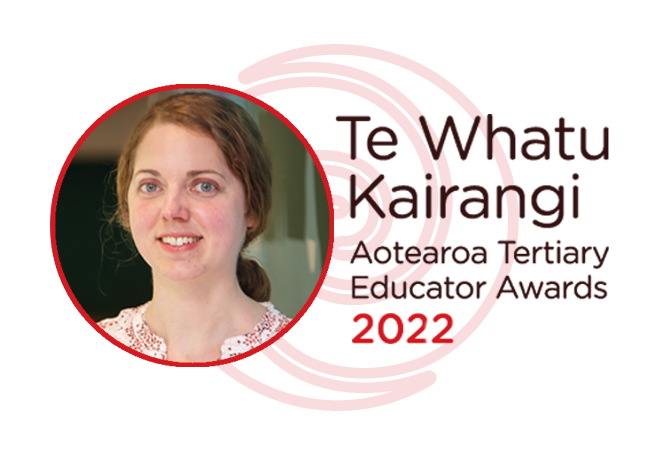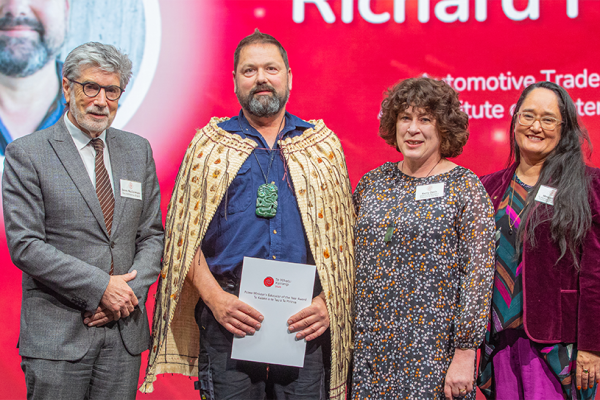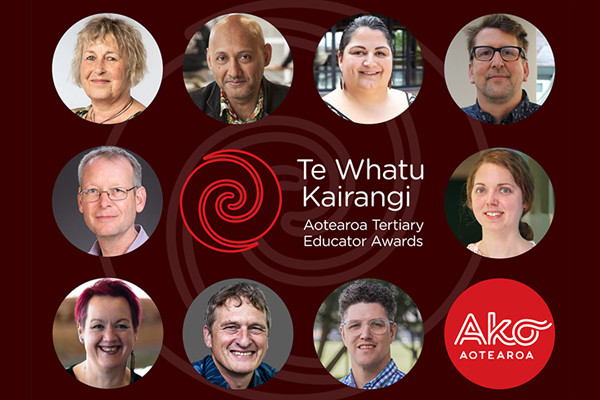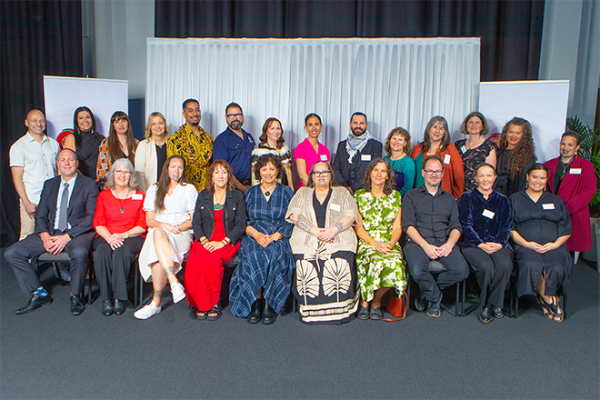Carolyn Gates
A legend guiding great vets of the future
Prime Minister’s Educator of the Year Award 2022
and General Award Winner | Advance approaches to, and the outcomes of, work-based learning
Professor in Veterinary Epidemiology and Education | Te Kunenga ki Pūrehuroa | Massey University
Watch Professor Carolyn Gates' Teaching profile video
“Education is at the heart of veterinary medicine since much our day-to-day work as clinicians revolves around helping our clients understand how disease impacts the wellbeing of animals under their care and providing them with the resources they need to make informed decisions about the different disease management options.”
After completing her veterinary degree in 2010 and her PhD in Veterinary Epidemiology in 2013, Carolyn worked as a full-time shelter medicine veterinarian for two years before joining Massey University as a lecturer in 2015. She has taught into more than 24 courses across all years of the Massey University Bachelor of Veterinary Science, Bachelor of Veterinary Technology, Master of Veterinary Science, and Master of Veterinary Medicine degrees. She also provides clinical supervision to final-year veterinary students during their rotations through the companion animal primary care practice in the Massey University Veterinary Teaching Hospital (MUVTH).
Carolyn’s teaching focuses on finding innovative ways of transferring research findings back to the veterinary profession, as well as to clients, to help improve patient outcomes. She uses a variety of teaching formats, including traditional lectures, large-group tutorials, small-group tutorials, hands-on practicals, and online learning. She is an active research scientist, focusing on studying animal populations to learn how to better diagnose, manage, and treat diseases. She has secured more than $1.9 million in competitive funding as a principal investigator and has published over 75 peer-reviewed manuscripts in the past seven years.
In 2018, she was awarded a Massey University Early Career Research Medal and an International Society for Veterinary Epidemiology and Economics (ISVEE) Emerging Scientist Award. She has supervised three post-doctoral researchers, nine PhD students (including five as primary supervisor), six Masters students, and five undergraduate students as well as mentoring more than 50 BVSc students through research-based coursework.
Carolyn is a strong proponent of Competency Based Veterinary Education (CBVE), focusing on what learners can actually do rather than on what they know. Every learning activity she designs is specifically aimed at placing students in either real or simulated workplace settings where they learn key concepts in the context in which they will be using them. She empowers students to take charge of their own education by providing them with resources that facilitate self-directed learning as well as opportunities to reinforce their learning through teaching their peers. When she first started at Massey, she noted that the average caseload of companion animal desexing surgeries coming through was low; it seemed that most clinics were not comfortable with having supervised students on external placements assist with surgical procedures on client-owned animals. As a result, many students were graduating without sufficient experience to perform these routine procedures competently by themselves in clinical practice. As a second-year veterinary student at the University of Pennsylvania, Carolyn had established a volunteer programme where students learned how to perform desexing surgeries at local animal shelters in exchange for providing administrative and nursing help. As this programme made such a significant impact on her future career as a small animal veterinarian, she wanted to create a similar opportunity for students at MUVTH. In July 2017, she launched the Massey-SPCA Desexing Clinic in partnership with SPCA Palmerston North to provide students with valuable hands-on clinical and surgical training earlier in the BVSc degree, while simultaneously providing a valuable low-cost desexing service for cat owners and animal rescue organisations. To better prepare the high volume of inexperienced students coming through the clinic and to ensure patient safety, Carolyn developed a series of interactive online lessons with step-by-step instructions, procedural videos, and quiz questions, which have since been used as exemplars for other staff looking to create similar clinical teaching resources. She also developed detailed station guidelines and laminated checklists for the student surgery suite, providing students with additional support.
After noticing gaps in the veterinary curriculum that meant some students were still struggling to master basic surgical skills, Carolyn developed a suite of inexpensive low-fidelity simulation models in 2019 made from plywood, t-shirt yarn, picture hanging hooks, and tea towels. This enabled students to practise core desexing surgery skills prior to working with real patients. These models reduced the average student surgery time, improved student confidence, and lowered surgical complication rates. Carolyn also published detailed guidelines and presented this work at domestic and international conferences. In 2018, she received a Massey University Early Career Teaching Excellence Award in recognition of the impact this programme has had on student learning and the clinic was awarded an Aotearoa New Zealand John Schofield Three Rs Implementation Award for reducing and refining the use of animals in teaching. The clinic has also been featured in two national media stories to celebrate its 500th and 2000th surgery milestones. After the MUVTH secured a formal contract in 2019 with SPCA Palmerston North to provide routine veterinary services for their shelter animals, Carolyn took the lead in developing this new caseload into a compulsory one-week final year rotation. Because of the large number of students participating, and to ensure consistency around learning experiences and assessment, she developed an online portfolio of 30 common clinical case scenarios and procedural skills lessons, designed to replicate a typical “week-in-the life” of a shelter veterinarian.
During New Zealand’s COVID-19 lockdown in March 2020, Carolyn led an initiative built on this successful model to create a “Virtual Veterinary Teaching Hospital”, mapping out a curriculum of over 100 clinical case vignettes and procedural skills lessons to ensure students were getting exposure to essential clinical competencies. She created a 40-page training guide and implemented a peer-review process for each case as quality control. Post-lockdown, she secured the opportunity to include these cases as a 6-week block in a problem-based learning course during the students’ final pre-clinical semester to better prepare them for managing clinical cases on rotations.
She was awarded the 2020 Australasian Society for Computers in Learning in Tertiary Education (ASCILITE) Emerging Scholars Award in recognition of her innovations in blended learning and presented this work at the Australia New Zealand College of Veterinary Scientists (ANZCVS) Science Week virtual conference in July 2021. This raised awareness of the value of blended learning for reducing and replacing the use of live animals for teaching in veterinary medical programmes. Carolyn joined the American Association of Veterinary Medical Colleges (AAVMC) CBVE Research Working Group in 2020 and is currently leading an international cross-sectional survey around current methods of feedback and assessment on final year clinical rotations across the 55 AAVMC member schools. In recognition of the growing influence of her teaching practices on others, she was awarded Senior Fellowship in the Higher Education Academy (SFHEA) in 2021, and a Massey University Vice Chancellor’s Teaching Excellence Award in 2021.
“For me, the most rewarding impact has been feedback from students and new graduates about how much difference the programme has made in easing their transition into clinical practice.”



